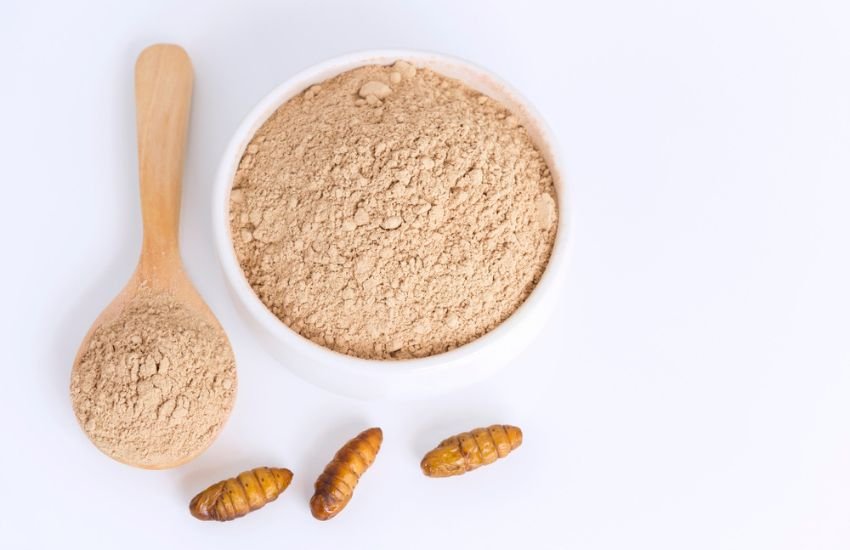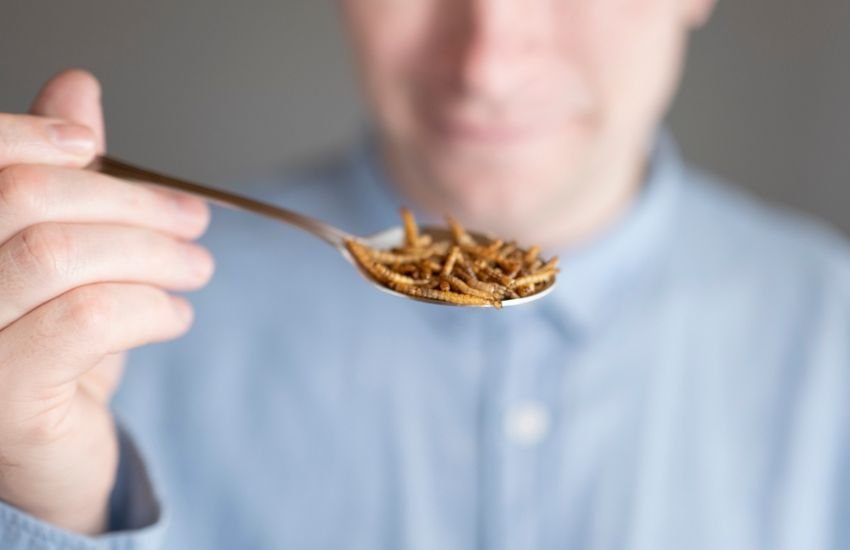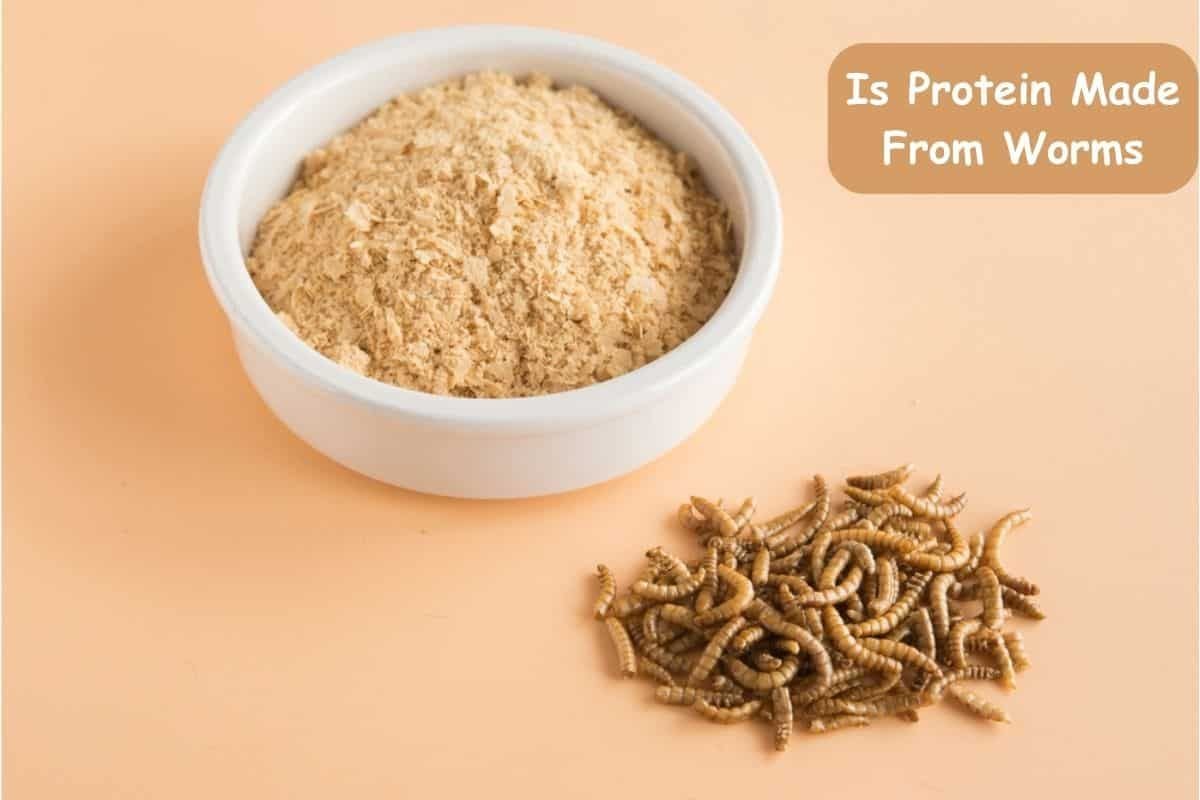Protein is a macronutrient that is made up of many building blocks called amino acids. It is responsible for various functions in the body, including muscle growth, tissue repair, and enzyme production.
With the increasing popularity of alternative protein sources like meat, dairy, and legumes. You might have heard the question: Is protein powder made from worms? The answer is yes.
In this blog post, we will explore worm protein, its benefits, function in the body, production process, and even the challenges that make this protein more popular.
What is Protein?
Protein is one of the 3 primary macronutrients essential to human health, alongside carbohydrates and fats. It’s made of amino acids and helps our body grow, stay strong, and heal. It’s important for muscles, skin, hormones, and enzymes.
There are 20 different amino acids that form proteins, and while some of these can be synthesized internally by the body, nine are considered essential, meaning they must be obtained through diet.
The body uses protein to build and repair tissues and make enzymes and hormones, and it is a critical building block of bones, muscles, cartilage, skin, and blood. The unique 3-dimensional sequence in which amino acids are arranged decides what each protein does in the body, showing how important they are for health and metabolism.
What are the functions of proteins in the body?
Proteins have a vital role in many biological processes in the human body. Here are some of the key functions:
- Proteins act as enzymes that speed up biochemical reactions, increasing the rate at which they occur and enabling various bodily functions.
- Play a crucial role in the growth and repair of tissues, including muscles, skin, hair, and nails.
- It also helps regulate our immune system by producing antibodies that fight off infections and diseases.
- They transport molecules such as oxygen and nutrients throughout the body.
- Some proteins bind and carry atoms and small molecules within cells and throughout the body.
- Proteins form antibodies that are critical to the immune response, helping the body to recognize and neutralize foreign objects like bacteria and viruses.
What is Worm Protein?
Worm protein, also known as insect protein, is derived from the bodies of mealworms or earthworms.
Insect protein powder is not a new concept, and in many parts of the world, it has been consumed for centuries. According to FAO, insects are a staple food source for about 2 billion people worldwide, but only recently has there been an increase in Western countries’ interest.
When it comes to protein, worm protein powder holds its own against beef, pork, chicken, and fish, offering a great option for those cutting back on meat. Holding up to 65% protein by dry weight, worm protein is a super-nutrient-rich food choice.
In terms of taste, people often like the mild, nutty flavor of worm protein. It can be added to different foods like smoothies and baked goods without changing the taste too much.
What are the benefits of worm protein?
Worm proteins are rich in nutrients and a great source of essential amino acids. But there are some other reasons that make this protein slowly gaining recognition in the health and nutrition sector.
- Worm farming has a low environmental impact, requiring less land, water, and feed than traditional livestock farming.
- Some studies suggest that mealworm protein could help reduce cholesterol levels.
- It offers an alternative protein source, potentially mitigating food security issues.
- Support gut health due to its high fiber content.
- Worm farming can help reduce organic waste, as they can eat and recycle a variety of organic materials.
Is protein powder made from worms?

Yes, some protein powder is made from worms, specifically mealworms or earthworms. However, the common protein powder that we used to consume does not contain any worms, and it is a common misconception that needs to be addressed.
Worm protein powder may not be widely known or available yet, but it’s a good choice for people seeking different protein sources that are good for the environment and full of nutrients.
Worm protein, or insect protein, is rich in essential amino acids, vitamins, and minerals, making it a nutritious option for supplementing diets. It’s a healthy choice to add to your diet.
But don’t worry, if the thought of consuming worm protein is not for you, there are plenty of other protein powder options available. As mentioned earlier, whey, casein, soy, pea, hemp, and rice protein are all popular choices with their unique benefits.
Myth busted: Protein powder isn’t all worm-based
Not all protein powders come from worms. Some supplements use worm protein, showing how diverse and innovative the nutrition industry can be.
It’s crucial to note that most protein powders on the market are primarily sourced from whey (a byproduct of cheese making), plants (like peas, rice, or hemp), and other animal sources.
The use of worm protein shows how we’re looking for sustainable, eco-friendly food. Manufacturers who produce worm-based protein powders usually talk about how efficient and eco-friendly insect farming is compared to regular livestock practices.
Methods used in worm protein production

Creating worm protein involves several methods some of them are include:
- Breeding: Worms are bred in a controlled environment usually in large bins or containers. Special conditions are maintained to ensure their rapid breeding.
- Feeding: Worms are fed with organic waste material. They are efficient waste converters and can consume anything from vegetable peels to coffee grounds.
- Harvesting: Once the worms have reached a suitable size, they are harvested. This means they separate them from their waste products which is called worm castings.
- Processing: The harvested worms are then processed into a protein-rich powder. This involves cleaning, drying, and grinding the worms into a fine powder.
- Packaging: The worm protein powder is then packaged and ready for distribution. It can be used as a supplement or incorporated into various food products.
The above process highlights the sustainability and efficiency of worm protein production. It uses fewer resources as compared to traditional livestock farming and reduces waste by utilizing organic waste as feed.
What makes worm protein more popular?
There is an increasing global interest in worm protein, and several factors contribute to its rising popularity. First off, worm farming is a big winner when it comes to environmental sustainability.
It’s a great alternative to traditional livestock farming, which is known for its high greenhouse gas emissions and land use. Worm farming requires less land, water, and feed, which makes it a great choice in light of our planet’s pressing environmental issues.
Moreover, worm protein is highly nutritious, and contains all essential nine amino acids that our bodies can’t produce on their own. It’s also a good source of B vitamins, iron, and other vital minerals.
Earthworms are packed with protein and a range of amino acids. The protein content in earthworm meal was a solid 54.6–59.4% based on dry weight.
Lastly, worm protein offers a potential solution to food security concerns, especially as the world’s population continues to grow. These factors collectively contribute to the increasing acceptance and popularity of worm protein.
What is the future of worm protein?
The future of worm protein looking great. It aligns with the global push for sustainable and eco-friendly food sources.
As we know traditional livestock farming has well-known negative environmental impacts. However, worm farming provides an appealing alternative with its low carbon footprint.
Advancements in food technology could make worm protein more widely accepted. Changing consumer attitudes towards alternative protein sources may also facilitate its integration into mainstream diets.
Ongoing research and development have the potential to transform worm protein into more than just a dietary staple. It could become a crucial solution to global nutrition and food security challenges.
Moreover, there are several new processing methods including high-pressure processing and extrusion that make it super easy to make worm protein in different forms – powders, protein bars, and other food products. So now, it’s a versatile and accessible protein source for everyone.
Conclusion
While the idea of protein made from worms may initially seem unusual. But it’s important to keep an open mind and consider the potential benefits. Worm protein offers a sustainable and nutrient-rich alternative to traditional protein sources.
It has many benefits. It’s highly digestible and packed with essential amino acids. Using mealworms as a protein source can help address food production and sustainability challenges. It’s great to pave the way for a more environmentally conscious future.
FAQ
How much protein does a worm have?
Mealworms are surprisingly high in protein. These mealworms are approximately 20-25% protein by weight. This makes them a valuable source of dietary protein.
Can I use worm protein powder as a meat substitute?
Yes, you can! Worm protein powder can be used as a replacement for traditional animal protein sources in meals. It’s also versatile and can be used in a variety of recipes like burgers, meatballs, and even desserts.
Is worm protein safe to consume?
Yes, it is completely safe to consume worm protein. In fact, it is already approved and used as an ingredient in many foods such as pasta, bread, and even pet food. It’s also important to note that worm farming ensures high quality and safe production of the protein powder.
Is whey protein powder made from bugs?
No, whey protein powder is not made from bugs. It is a byproduct of cheese production which derived from cow’s milk. During the cheese-making process, the liquid that separates from the curd is called whey. It is then processed and purified into a protein-rich powder. It’s popularly consumed for muscle recovery after workouts. However, whey protein is not made from bugs, but there are other protein powders in the market which derived from insects, like mealworm protein powder.
Is protein powder made from maggots?
No, protein powder is not made from maggots. Maggots, which are the larval stage of flies, are generally not used in the production of protein powders. Most protein powders on the market are derived from sources like whey (a dairy product), plant-based sources (like peas, rice, or hemp), or even insects like crickets and mealworms, not maggots. There may be some exceptions, especially in the field of animal feed, but as far as human consumption is concerned, maggots are not a common source of protein powder.
Is Gold Standard Whey protein halal?
Yes, Gold Standard Whey Protein is halal-certified. Optimum Nutrition, the manufacturer of Gold Standard Whey, has obtained certification from the Islamic Food and Nutrition Council of America (IFANCA), which verifies that the product is processed in accordance with Islamic law.
Resources of the Article

Dr. Usman is a medical content reviewer with 12+ years of experience in healthcare research and patient education. He specializes in evidence-based health information, medications, and chronic health topics. His work is based on trusted medical sources and current clinical guidelines to ensure accuracy, transparency, and reliability. Content reviewed by Dr. Usman is for educational purposes and does not replace professional medical advice.
